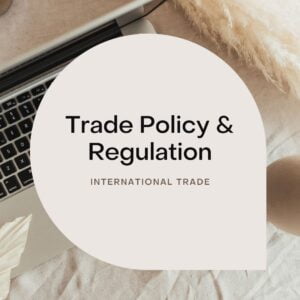Imagine a world where your morning coffee is unavailable, your smartphone is half as functional, and your wardrobe is limited to local fabrics. This scenario highlights the critical role of international trade in our daily lives. In 2022, global trade in goods and services amounted to over $28 trillion, showcasing the immense scale and importance of cross-border commerce
The Importance of Trade Policy & Regulation
Economic Impact
Trade policies play a role in shaping both global and national economies. By setting tariffs, quotas, and trade agreements, governments influence the flow of goods and services across borders. These policies can enhance economic growth by opening up new markets for domestic producers and providing consumers with access to a broader range of products. Conversely, protectionist policies, such as high tariffs and strict import restrictions, can lead to trade wars, reduce market efficiency, and ultimately hinder economic progress. For instance, the trade tensions between the United States and China have led to increased costs for businesses and consumers, disrupted supply chains, and contributed to global economic uncertainty.
Business Operations
Trade policies and regulations significantly impact the operations of multinational corporations and small businesses alike. For multinational companies, understanding and navigating various trade regulations is crucial for compliance and cost management. These policies affect where businesses can sell their products, the cost of importing raw materials, and the tariffs they must pay. Small businesses, which often lack the resources to manage complex regulatory environments, can be disproportionately affected by changes in trade policy. Simplified and transparent trade regulations can help small businesses expand internationally, while overly complex regulations can stifle innovation and growth.
Consumer Effects
Trade policies directly influence the prices and availability of goods and services for consumers. Tariffs on imported goods can lead to higher prices, reducing consumers’ purchasing power. For example, increased tariffs on imported electronics can make smartphones and computers more expensive for consumers. On the other hand, trade agreements that reduce tariffs and remove barriers can lower prices and increase the variety of products available. Additionally, trade regulations ensure that imported goods meet safety and quality standards, protecting consumers from harmful products.
Political and Social Implications
Trade policy is not only an economic tool but also a significant element of international relations and domestic politics. Countries use trade agreements to build alliances, while sanctions and tariffs can be employed to exert pressure on other nations. For example, the European Union’s trade policies promote economic integration and political stability among member states. Domestically, trade policy can be a contentious issue, influencing elections and public opinion. Policymakers must balance the interests of various stakeholders, including businesses, consumers, and workers, while navigating the broader geopolitical landscape. Trade policy decisions can thus have far-reaching implications, shaping the global order and impacting social and political stability.
Conclusion
In summary, trade policy and regulation are important determinants of economic health, business success, consumer welfare, and geopolitical stability. Understanding these aspects is essential for comprehending the complex dynamics of international trade and its far-reaching effects on the world.

